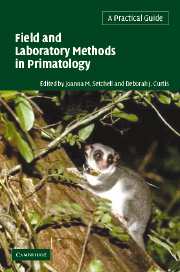Book contents
- Frontmatter
- Contents
- List of contributors
- Forword by Robert D. Martin
- Introduction
- 1 Human-nonhuman primate interactions: an ethnoprimatological approach
- 2 Habituating primates: processes, techniques, variables and ethics
- 3 Habitat description and phenology
- 4 The Global Positioning System, Geographical Information Systems and Remote Sensing
- 5 Monitoring local weather and climate
- 6 Survey and census methods: population distribution and density
- 7 Trapping primates
- 8 Handling, anaesthesia, health evaluation and biological sampling
- 9 Morphology, morphometrics and taxonomy
- 10 Marking and radio-tracking primates
- 11 Feeding ecology and seed dispersal
- 12 Dietary analysis I: Food physics
- 13 Dietary analysis II: Food chemistry
- 14 Collecting arthropods and arthropod remains for primate studies
- 15 Tape-recording primate vocalisations
- 16 Photography and video for field researchers
- 17 Chronobiological aspects of primate research
- 18 Thermoregulation and energetics
- 19 Field endocrinology: monitoring hormonal changes in free-ranging primates
- 20 Collection, storage and analysis of non-invasive genetic material in primate biology
- 21 Tips from the bush: an A-Z of suggestions for successful fieldwork
- Index
- References
21 - Tips from the bush: an A-Z of suggestions for successful fieldwork
Published online by Cambridge University Press: 05 June 2012
- Frontmatter
- Contents
- List of contributors
- Forword by Robert D. Martin
- Introduction
- 1 Human-nonhuman primate interactions: an ethnoprimatological approach
- 2 Habituating primates: processes, techniques, variables and ethics
- 3 Habitat description and phenology
- 4 The Global Positioning System, Geographical Information Systems and Remote Sensing
- 5 Monitoring local weather and climate
- 6 Survey and census methods: population distribution and density
- 7 Trapping primates
- 8 Handling, anaesthesia, health evaluation and biological sampling
- 9 Morphology, morphometrics and taxonomy
- 10 Marking and radio-tracking primates
- 11 Feeding ecology and seed dispersal
- 12 Dietary analysis I: Food physics
- 13 Dietary analysis II: Food chemistry
- 14 Collecting arthropods and arthropod remains for primate studies
- 15 Tape-recording primate vocalisations
- 16 Photography and video for field researchers
- 17 Chronobiological aspects of primate research
- 18 Thermoregulation and energetics
- 19 Field endocrinology: monitoring hormonal changes in free-ranging primates
- 20 Collection, storage and analysis of non-invasive genetic material in primate biology
- 21 Tips from the bush: an A-Z of suggestions for successful fieldwork
- Index
- References
Summary
INTRODUCTION
This guide is designed to provide a light-hearted, yet serious, list of suggestions for improving your comfort and safety in isolated tropical locations where the facilities may be relatively basic. We hope that it will also be useful for research and travel under less arduous conditions. It has been written as both a checklist and a set of instructions, gleaned from conversations with a wide variety of fieldworkers over a number of years and through personal experience. We end with a few wise sayings relating to the environment – to keep you going in times of adversity.
A
Adaptors. Check what sort of electrical sockets to expect at your destination and take the right adaptors.
Ant-proof socks. Have you ever had the problem of army ants invading your trousers so that you have to get undressed to pull them out of your skin? Just in case you do, tuck in your trouser bottoms and use Gortex¯ over-socks. Ants are unable to negotiate the smooth material and never make it to your nether regions. These socks also keep your feet dry, since water can only pass out. Not very glamorous, but at least you can feel smug while your companions disrobe in a hurry or suffer from rotting feet.
B
Bags. Hip bags of various kinds are invaluable, and cloth bags/shoe bags of different sizes and colours can help to store things and enable you to find them quickly at the bottom of a rucksack. Large polythene bags will keep things dry and double as laundry bags (see also Zip-lock or self-seal bags).
[…]
- Type
- Chapter
- Information
- Field and Laboratory Methods in PrimatologyA Practical Guide, pp. 309 - 323Publisher: Cambridge University PressPrint publication year: 2003



